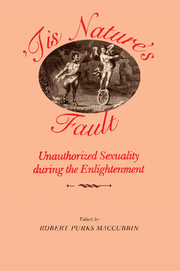Book contents
- Frontmatter
- Contents
- Introduction
- “The Secrets of Generation Display'd”: Aristotle's Master-piece in Eighteenth-Century England
- Sexual Imagination as Revealed in the Traité des superstitions of Abbé Jean-Baptiste Thiers
- Married but not Churched: Plebeian Sexual Relations and Marital Nonconformity in Eighteenth-Century Britain
- Moral Values in “La Suite de l'Entretien”
- Prostitution and Reform in Eighteenth-Century England
- The Properties of Libertinism
- Between the Licit and the Illicit: the Sexuality of the King
- The Sublimations of a Fetishist: Restif de la Bretonne (1734-1806)
- Sodomitical Subcultures, Sodomitical Roles, and the Gender Revolution of the Eighteenth Century: The Recent Historiography
- The Priest, the Philosopher, and Homosexuality in Enlightenment France
- The Pursuit of Homosexuality in the Eighteenth Century: “Utterly Confused Category” and/or Rich Repository?
- Sodomy in the Dutch Republic during the Eighteenth Century
- Parisian Homosexuals Create a Lifestyle, 1700-1750: The Police Archives
- The Censor Censured: Expurgating Memoirs of a Woman of Pleasure
- Chthonic and Pelagic Metaphorization in Eighteenth-Century English Erotica
- Modes of Discourse and the Language of Sexual Reference in Eighteenth-Century French Fiction
- The Mélange de poésies diverses (1781) and the Diffusion of Manuscript Pornography in Eighteenth-Century France
- Obscene Literature in Eighteenth-Century Italy: an Historical and Bibliographical Note
Sexual Imagination as Revealed in the Traité des superstitions of Abbé Jean-Baptiste Thiers
Published online by Cambridge University Press: 06 July 2010
- Frontmatter
- Contents
- Introduction
- “The Secrets of Generation Display'd”: Aristotle's Master-piece in Eighteenth-Century England
- Sexual Imagination as Revealed in the Traité des superstitions of Abbé Jean-Baptiste Thiers
- Married but not Churched: Plebeian Sexual Relations and Marital Nonconformity in Eighteenth-Century Britain
- Moral Values in “La Suite de l'Entretien”
- Prostitution and Reform in Eighteenth-Century England
- The Properties of Libertinism
- Between the Licit and the Illicit: the Sexuality of the King
- The Sublimations of a Fetishist: Restif de la Bretonne (1734-1806)
- Sodomitical Subcultures, Sodomitical Roles, and the Gender Revolution of the Eighteenth Century: The Recent Historiography
- The Priest, the Philosopher, and Homosexuality in Enlightenment France
- The Pursuit of Homosexuality in the Eighteenth Century: “Utterly Confused Category” and/or Rich Repository?
- Sodomy in the Dutch Republic during the Eighteenth Century
- Parisian Homosexuals Create a Lifestyle, 1700-1750: The Police Archives
- The Censor Censured: Expurgating Memoirs of a Woman of Pleasure
- Chthonic and Pelagic Metaphorization in Eighteenth-Century English Erotica
- Modes of Discourse and the Language of Sexual Reference in Eighteenth-Century French Fiction
- The Mélange de poésies diverses (1781) and the Diffusion of Manuscript Pornography in Eighteenth-Century France
- Obscene Literature in Eighteenth-Century Italy: an Historical and Bibliographical Note
Summary
We are all familiar with the difficulties involved in describing the amorous practices of the classical age. We know that contemporary authors, les moralistes themselves, spoke of love a great deal, but they did so in terms so general that they never seem to refer to the experiences of an individual or a phenomenon of their society. So we are left to investigate demographic statistics, birth registers, and confessors' handbooks; but the search for information about actual amorous practices continues to prove futile; nothing shows through beyond the fleshless abstraction of figures. For those who remain undaunted, there is the novel, which had already become numerically significant by the seventeenth century and which dominated the eighteenth. Love often provided its subject matter. Some would say that it was the preferred subject matter, if not the only one. The novel was even to come under attack for this reason, on the grounds that it corrupted young men and sullied young women. When Dr. Bienville comes to seek the causes of nymphomania when relating the case history of one of his patients, it does not take him long to point to the harmful influence of servants and the pernicious effects of Marivaux's novels. Ah, who would ever have imagined—and dared say—that it was so! Similarly, when J.-L. Flandrin, in his remarkable Amours paysannes, leaves the barren shores of sociological and statistical sources and seeks evidence of actual experience, it is to Restif's fiction that he turns.
- Type
- Chapter
- Information
- 'Tis Nature's FaultUnauthorized Sexuality during the Enlightenment, pp. 22 - 30Publisher: Cambridge University PressPrint publication year: 1988



